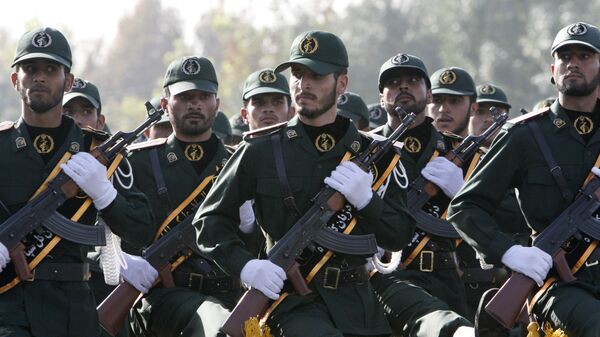Major General Gholam Ali Rashid, the commander of the Islamic Revolution Guards Corps (IRGC), has pledged that Iran would do its best to avoid a military conflict but that it will not think twice before retaliating in response to foreign aggression.
“Just as we will watch for the breakout of a war with intelligence command, prudence and power, we are much more ready and agile than the past to inflict heavy costs on the aggressor and will make a quick decision [in this vein]”, Ali Rashid said during a visit to Iranian naval units near the Strait of Hormuz.
He reiterated that Iran’s response to any possible intrusion on its Persian Gulf islands as well as its maritime and aerial borders would be “powerful”, forcing the potential aggressors to regret their actions.
Ali Rashid also warned that “should there ever be a war, nobody will be in control of either its duration or its scope”.
He also voiced hope that the US and its allies had learned lessons from their “mistake” in invading Iraq and Afghanistan in 2003 and 2001, respectively.
Iran’s Files Complaint to UN Over US Military Drone
His remarks came a few days after Iranian Deputy Foreign Minister Gholamhossein Dehghani was quoted by the semi-official Tasnim news agency as saying that Tehran had formally lodged a complaint with the UN in connection with its airspace's violation by a US unmanned aerial vehicle earlier in June.
Dehghan said that the complaint was filed with “the UN Security Council over the aggression against our airspace by the American drone […]” and that the document states that Tehran “reserves the right to respond firmly if the US repeats the violation”.
On June 20, the IRGC said that that they had downed a US Northrop Grumman RQ-4 Global Hawk surveillance drone flying over the coastal Hormozgan Province because it violated the country's airspace.
The US Central Command, for its part, claimed that the unmanned aerial vehicle was hit while operating over international waters in the Strait of Hormuz.
IRGC Commander-in-Chief, Major General Hossein Salami described the downing of the drone as a “clear message” to Washington that Tehran would "react strongly" to any aggression.
He was echoed by Speaker of Iran's parliament Ali Larijani, who warned that the US military will get an even “stronger” response if it dares to violate Iran’s borders.
US-Iranian Tensions Persist
US President Donald Trump, for his part, took to Twitter shortly after the downing to claim that he halted a military strike against three sites in Iran a mere 10 minutes before it was set to be carried out, upon learning that some 150 Iranians were projected to die in the attack.
The incident, which added to increasing tensions between Tehran and Washington, came after an apparent sabotage attack against two oil tankers off Iran's coast in the Gulf of Oman earlier last month.
While Washington blamed Tehran for the attack, the Iranian Foreign Ministry accused the US and its Israeli and Gulf State allies of deliberately escalating the regional situation to “cover up” the US’ “economic terrorism against Iran”.
The US-Iranian tension have been deteriorating since the Islamic Republic’s move to suspend some of its obligations under the 2015 Iran nuclear deal, also known as the Joint Comprehensive Plan of Action (JCPOA), on 8 May.
This was followed by the US boosting its military presence in the Persian Gulf in what US National Security Adviser John Bolton said was "a clear and unmistakable signal to the Iranian regime that any attack on the interests of the United States or [its] allies will be met with ruthless force".
At the same time, US President Donald Trump said that he hopes to avoid a war with Iran, with Iranian Supreme Leader Ayatollah Ali Khamenei also stressing that Tehran does not intend to wage war with the US but will continue to resist its pressure.




